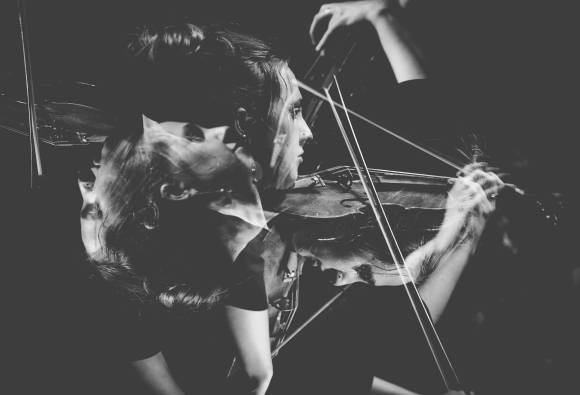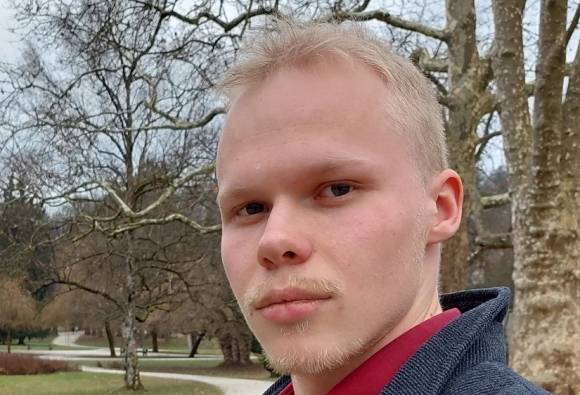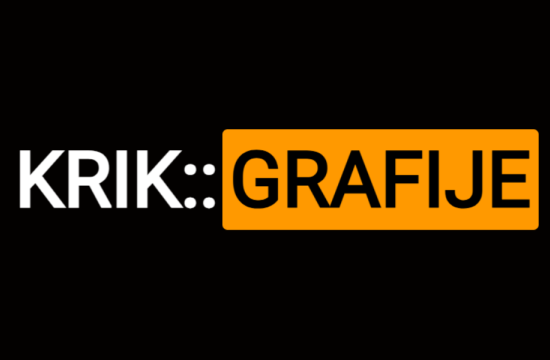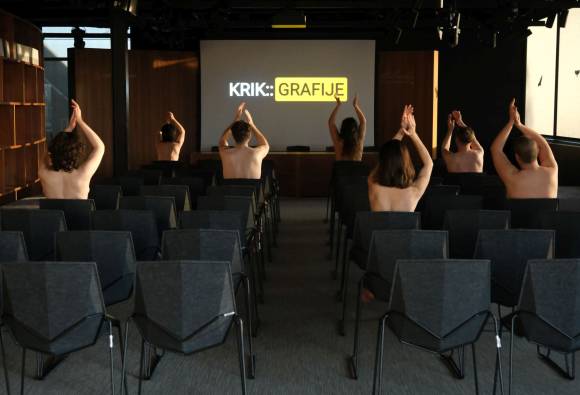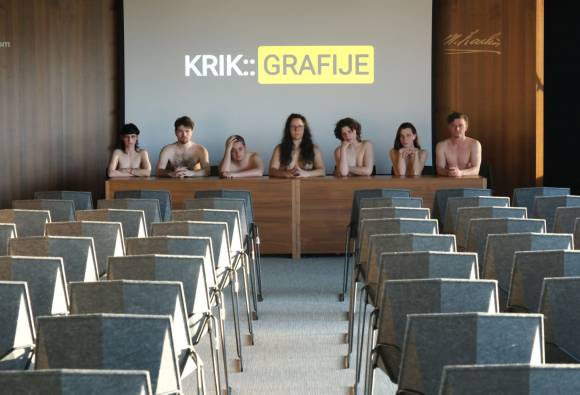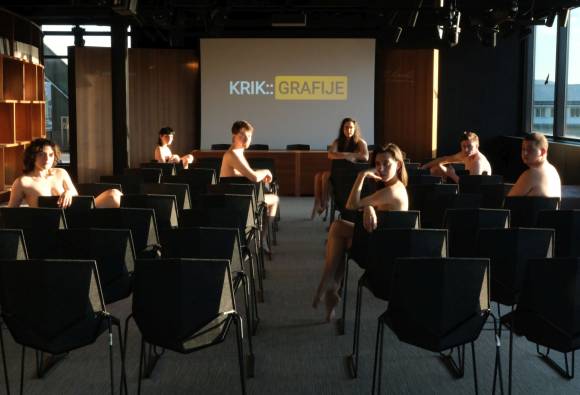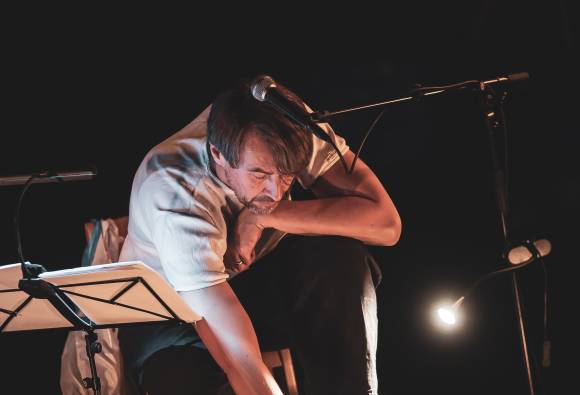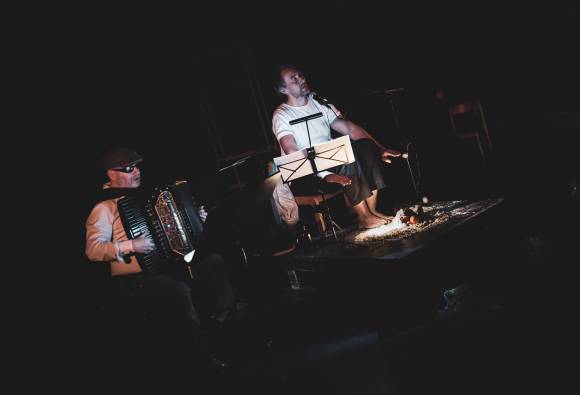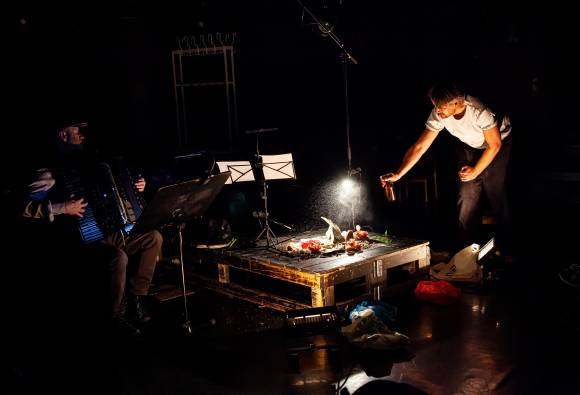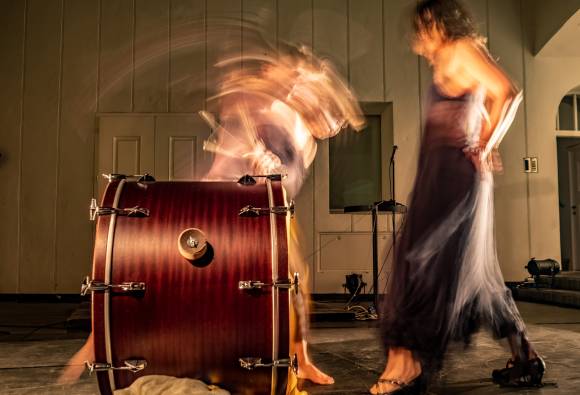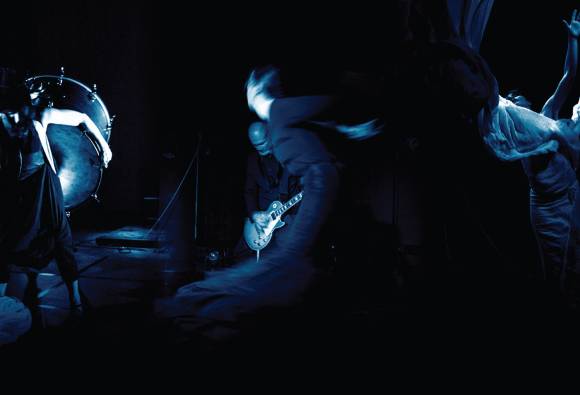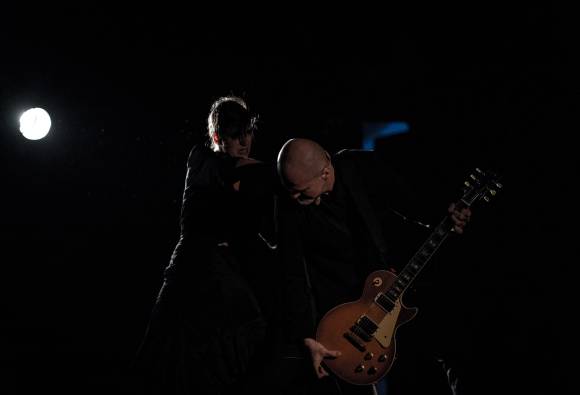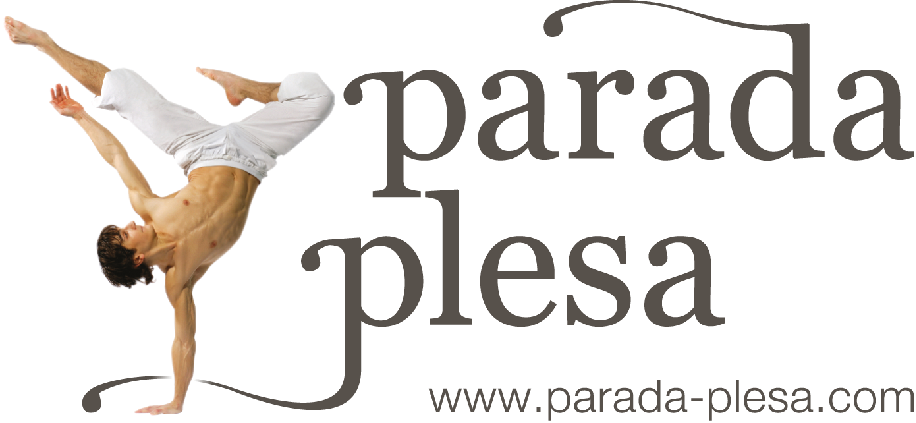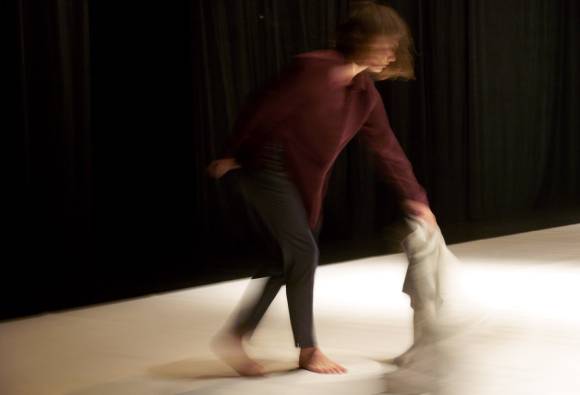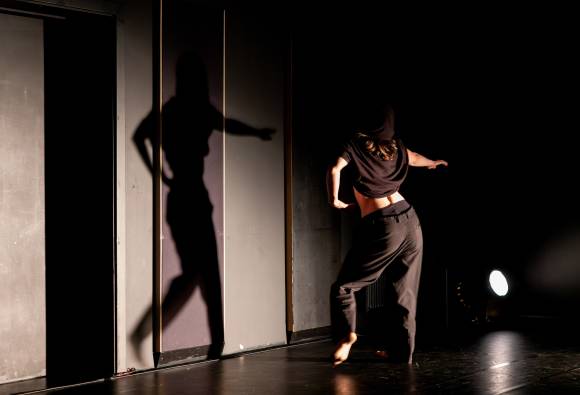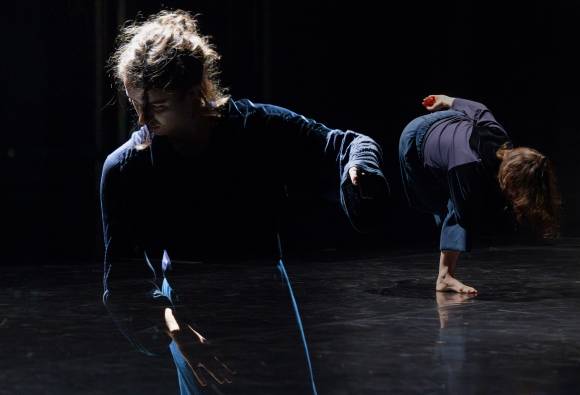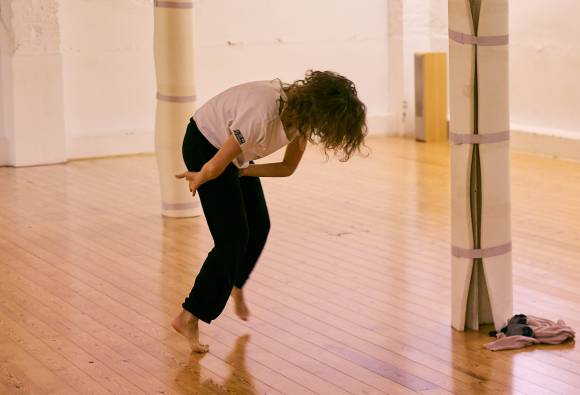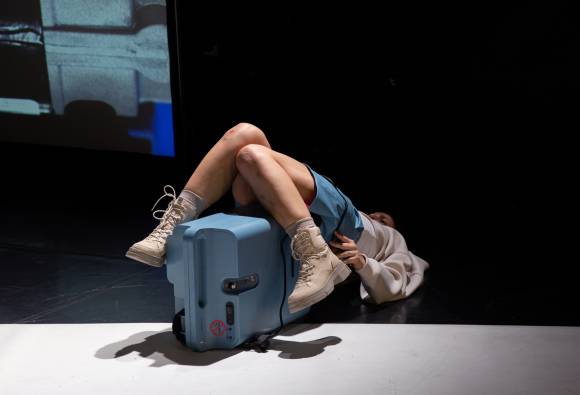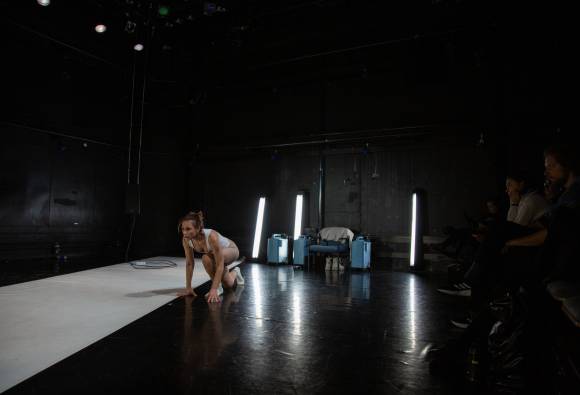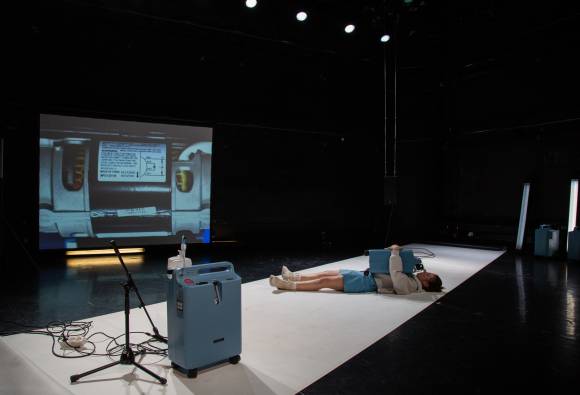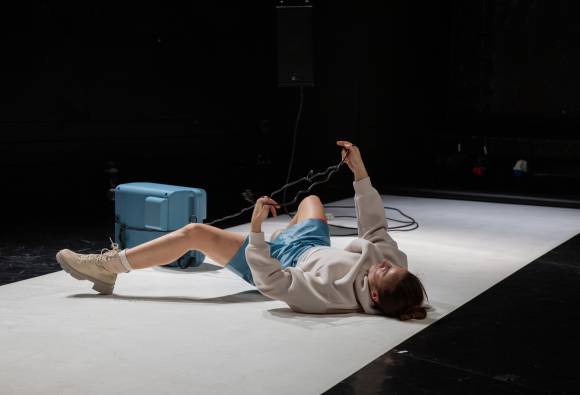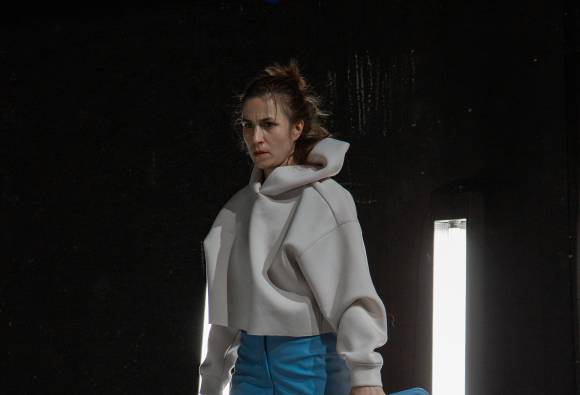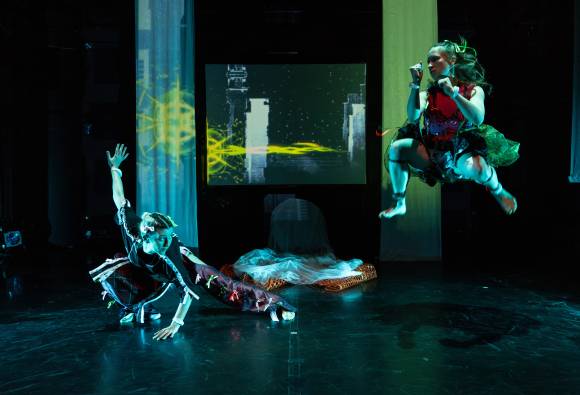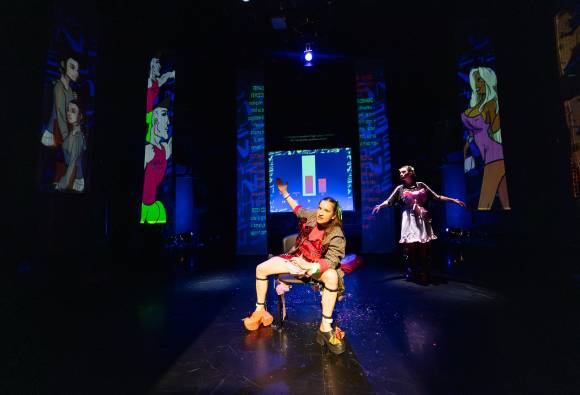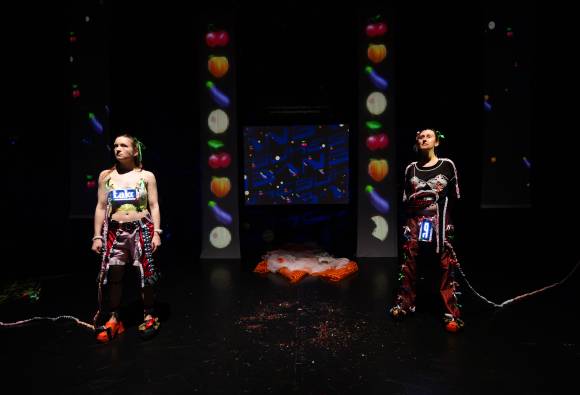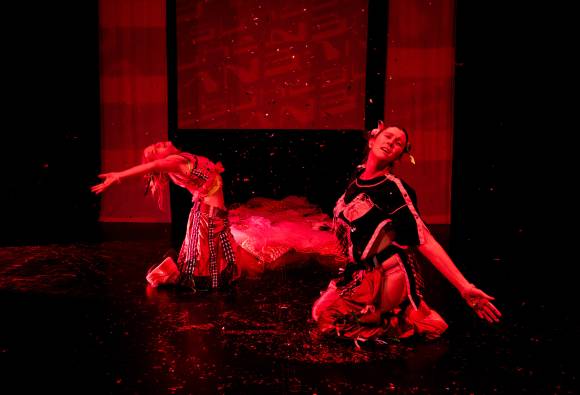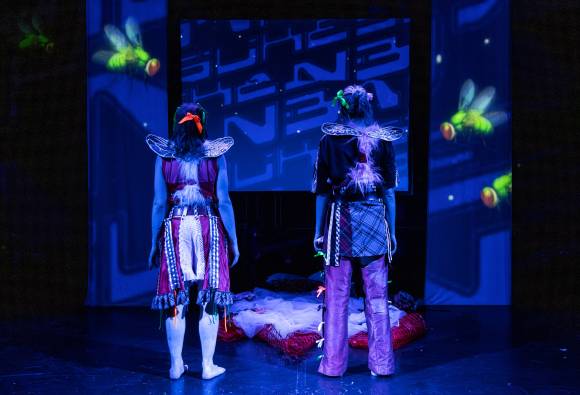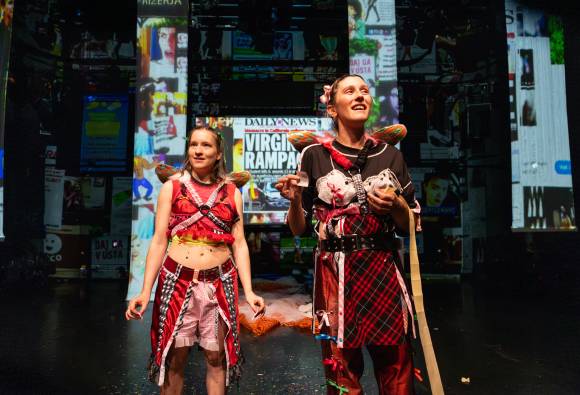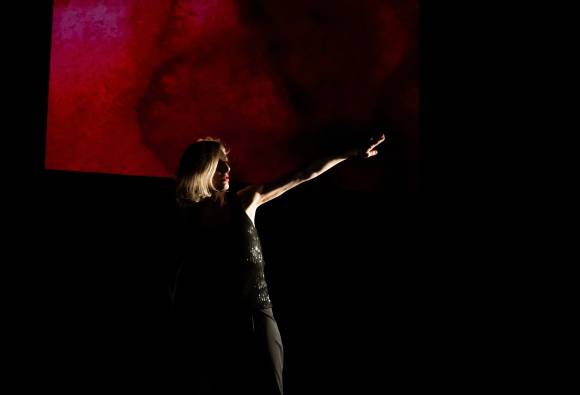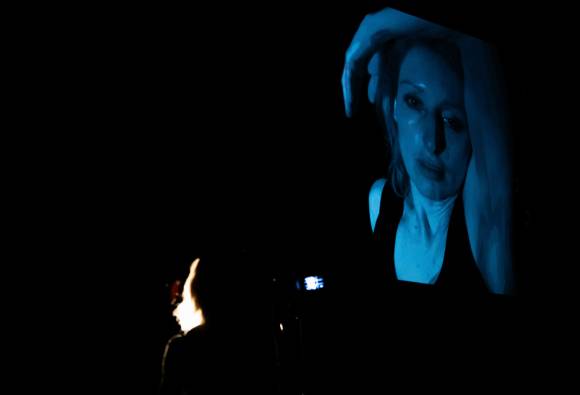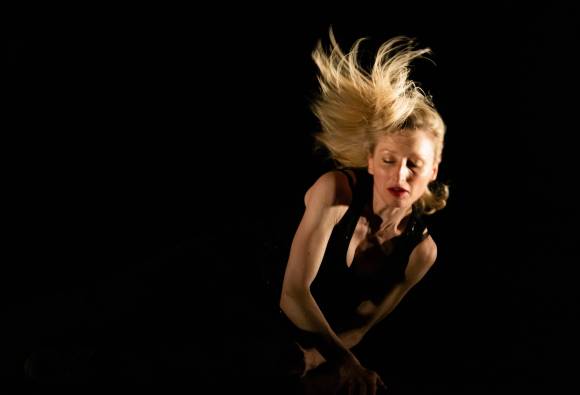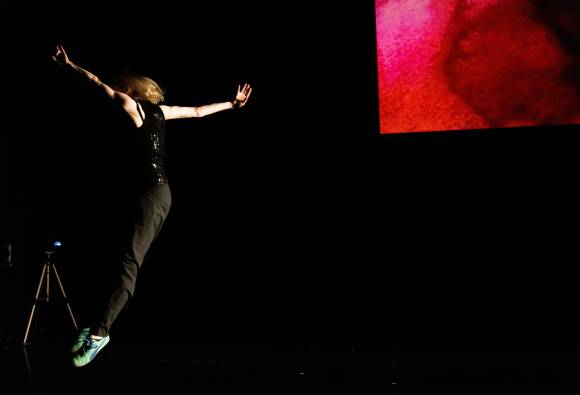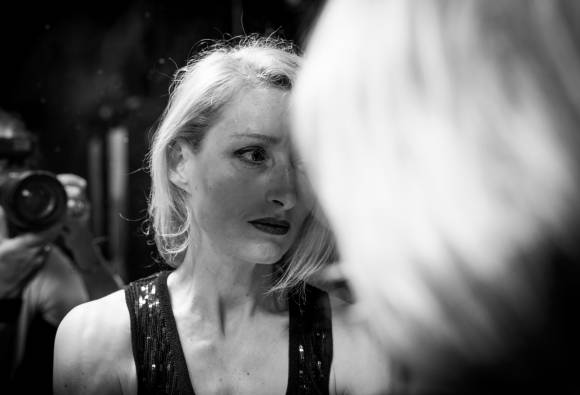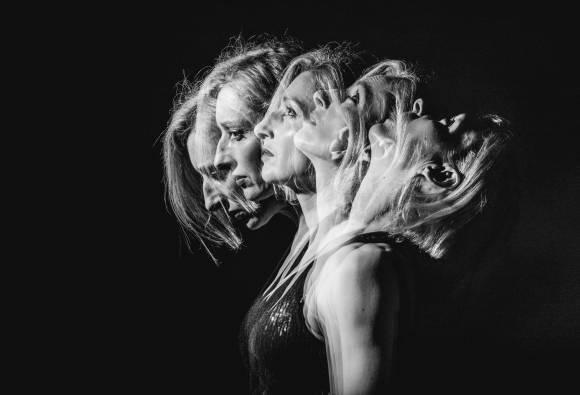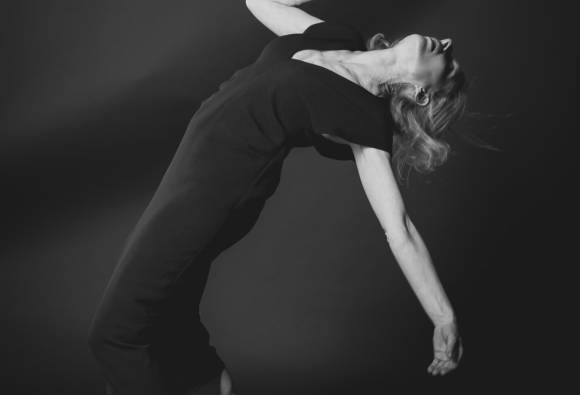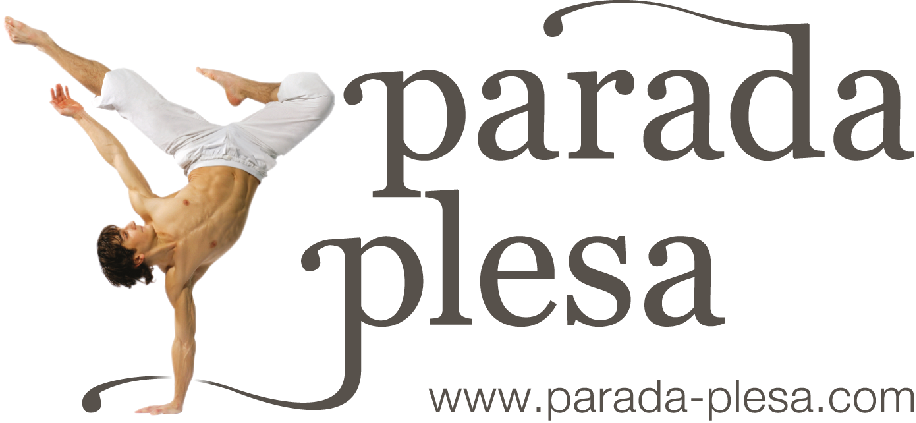
“MAŠINA” (The Machine) Workshop – Bojana Robinson
The dance and movement workshop is dedicated to opening up and finding analogies between the artistic practice and work methodologies used in the performance Mašina. In her original project, Bojana explores strategies of staging and discovering different performative mechanisms for addressing issues from the intimate corpus in the public sphere. The workshop begins with a warm-up focusing on the anatomy of the body and the perception of the body as a whole. In the creative part, we will explore choreographic procedures that incorporate principles of repetition, accumulation and composition in the layering of different elements of the performance.
The workshop is admission free and suitable for everyone with a good prior knowledge in the field of dance.
Registration is required at bojanamisic@yahoo.com.
Workshop participants enjoy reduced admission to the show (EUR 7).
More on Bojana:
https://koreografski.info/bojana-robinson/
https://nda.si/Bojana-Robinson
“MAŠINA” (The Machine) Workshop – Bojana Robinson
The workshop is admission free and suitable for everyone with a good prior knowledge in the field of dance.
Workshop participants enjoy reduced admission to the show Mašina (The Machine) 7 EUR.
Registration is required at bojanamisic@yahoo.com

Introduction to 21st-century Composition
In collaboration with Inštitut .abeceda
The concert will be preceded by a Q&A with the featured artists at 19.00.
Programme:
Maximiliano Soto Mayorga, Anja Kralj: Sinfonia
Anja Kralj, violi
Ciril Zupan, electronics
*
Maj Brinovec: new work
Lan Podletnik Ašič: new work
Giacinto Scelsi: Maknongan
Maj Brinovec, baritone saxophone
*
Atli Ingolfsson: The Elves Other's Self
Domen Kužnar: Solo
Ulfar Ingi Haraldsson: new work
Domen Kužnar, viola

An original project of the REAKTOR collective, KRIK::GRAFIJE is an exploration of the codes embedded in the individual's body and psyche that guide people’s actions and are expressed through sexuality as pleasure drive systems. The artistic team address the phenomenon of addiction to the pursuit of pleasure on the cognitive and biological levels. The emergence of AI-generated content is progressively challenging our conception of what is possible – thus expanding the individual's reference field of visual material and generating new forms of potential fulfilment of sexual desire. The manipulation of video material, the rhythmising of bodies and voice, and the neuroscientific background of the pleasure drive are the performance’s main areas of research. The show examines the codification systems of individual experience, which are then manifested at the behavioural level and in the way (inter)personal relationships are formed.
KRIK, an ongoing project by the Kolektiv REAKTOR, sheds light on unspoken social taboos with a focus on sexuality and interpersonal relationships. The project was awarded the University Prešeren Prize for innovatively extending the boundaries between art and society.
Krik::grafije
14,00 EUR
12,00 EUR * * EUR for younger than 25 and older than 65, as well as pensioners.
Performed by Jure Žavbi, Tina Resman, Jure Rajšp
Director Aljoša Živadinov Zupančič
Dramaturges Katja Markič, Urša Majcen
Sound design Ana Jerina
Lighting design Domen Lušin
Video design Domen Lušin, Aljoša Živadinov Zupančič, Katja Markič, Urša Majcen, Jure Žavbi, Tina Resman, Jure Rajšp
Video processing Gregor Mesec
Costume design Claudi Sovrè
Production Kolektiv REAKTOR
Co-production Cankarjev dom, Zavod Delak

Based on the novella Ikar by Aleš Šteger
(from: Bogovi se nam smejijo, Beletrina, 2021)
Text and storytelling: Aleš Šteger
Original music: Jure Tori
Directed by: Jernej Lorenci
A show for fathers and sons.
A story about the search for inner freedom.
A story of freeing oneself from the past and personal trauma.
A story about becoming human again, about embracing the hardest thing,
the death of a loved one.
In Greek mythology, Daedalus, the builder of the labyrinth at Knossos, fashioned the wings with which he and his son Icarus escaped from Crete. Icarus flew too close to the sun and plummeted to his death.
What happens to the father who’s lost a son? How is the father to extricate himself from the trauma of his loss? This is the starting point of the show.
The story takes place today, in our modern world, on a Mediterranean island on the migrant route leading from the Mediterranean to Europe.
Intimate and overwhelming, the show captivates with its powerful narrative and poignant music.
For the past twenty-five years theatre director Jernej Lorenci has enjoyed a successful career directing in Slovenian and international theatres. He has won many important national and international awards for his directing. In 2006, he was appointed as an assistant professor of radio and theatre directing at AGRFT.
Author of over sixty books translated into more than twenty languages and winner of numerous international awards, Aleš Šteger is one of the most internationally recognised Slovenian writers.
Jure Tori is an accordionist and composer. With his idiosyncratic style of music-making, Tori virtually uses sound to draw stories that are open to visualisation. He has formed several groups, including Tori Tango, Tori Trio, Orlek, Flora & Paris and Satori.
Šteger and Tori have been performing together for a number of years, interpreting Šteger's poetry. Two years ago, their performance My War Accordion was produced by Cankarjev dom.
Dedal (Daedalus)
10,00 EUR

Ana Pandur: Tris - Triad
Špela Mastnak, Damir Avdić, Matej Bonin: Marija brez glasu, Črni zvoki, Beli šum (Voiceless Mary, Black Sounds, White Noise)
triad, a set or group of three
A hundred minutes for existence.
The 100-minute dance-music show TRIS (TRIAD), modifying and synthetising three independent dance-music projects developed over the last four years, constructs a cohesive unit of architecture. Bringing together three very dissimilar, exceptional music artists, Ana Pandur’s Tris offers a reflection on ways of being.
The path traversed by TRIS ranges from the emergence of an intangible third entity at the intersection of the idioms of music and dance, through the quest for the freedom of flight, on the assumption of an ideological shift of a creative mind, culminating in the establishment of one's own playing field of silence, whiteness, solitude and the body incorporated therein.
Marija brez glasu Voiceless Mary, a duo with percussionist Špela Mastnak and featuring music by Matej Bonin, is a slip, an intangible third entity that emerges at the intersection of two languages, on the borderline between projection and reality. The starting point is always the individual experience of a dancer and musician, whose narrative relates solely to the familiar, interlaced with the question of where in the process is the dimension of the universal, the common human, the connective, which flows comfortingly back into the particular. The female (dancing) body remains a permanent fixture, walking the line between communicating with the self and the externality, while remaining a field of projections, doubts, as well as the search for one's own space, at once a subject and an object.
Črni zvoki Black Sounds, a duo with Damir Avdić and his music, provides a starting point for reflection on the meaning and power of creativity, while raising questions about the ideological abuse of the transformative power of art. With Black Sounds we explore the field of freedom, the break with convention, the intersection of the moment of the personal and the real in a creative act and their implications in the social. Lorca's text, as inspiration and ideological foundation, lends substance to the overriding theme, which is in paradoxical relation to the distortion of meaning that the text has been subjected to in the 20th century, with an emphasis on historical repetition. Articulating a trans-genre freedom, the quest for meaning and the beauty within, or in spite of, a given context, is crucial. Black Sounds thematises the eternal recurrence of the same and the longing for the freedom of flight. Every system that resembles a game also entails a possibility of error, of slipping. At the same time, a slip can result in an ideological distortion that turns a newly created game, bereft of a final thought, into a tool of manipulation whilst also manipulating it. The scales can tip one way or the other. Searching for the intersection of two worlds where the imminence of the end/death is always a foregone conclusion, whether for production, ideological or political reasons, it examines the various consequences of the ideological abuse of creative thought.
Beli šum White Noise, a dance solo featuring music by Matej Bonin as the negative, leads to the creation of its own playing field. The solo is defined by silence, whiteness, solitude and the body incorporated therein. What are the rules of the game in a given situation, what is allowed, where are the limits and what defines them. Creating one's own space when all that is left is solitude. Who sees whom and how the limits of one's world affect the limits of one's freedom. The dance-music project White Noise addresses the themes of loneliness, isolation, punishment and the symbolic exclusion resulting from non-conformity with the current social paradigm and its implications.
Ana Pandur, je avtorica, koreografinja, plesalka, hispanistka in filozofinja je že v času študija na FF v Ljubljani kot izhodišče svojega umetniškega ustvarjanja in preučevanja privzela flamenko in njegovo aplikacijo v sodobne uprizoritvene prakse. Po izobraževanju iz klasičnega baleta je med letoma 2002 in 2004 študirala flamenko ples in teorijo na akademiji Amor de Dios v Madridu. Po povratku v Slovenijo je ustanovila PKD Flamenko, ki ga vodi še danes in iz katerega izhajajo najvidnejša imena sodobne flamenko panorame v našem prostoru. Zadnjih dvajset let deluje kot plesalka, koreografinja in plesna pedagoginja, povezuje flamenko s sodobnimi uprizoritvenimi praksami, s sodobnim plesom in gledališčem. Na Akademiji za ples v Univeze Alma Mater Europaea predava kot nosilka predmeta Medkulturne plesne prakse. Je avtorica številnih plesnih predstav, s poudarkom na interdisciplinarnem ustvarjanju, v katerem vzpostavlja svojstven avtorski, koreografski in uprizoritveni jezik, povezan s flamenkom. Kot koreografinja, plesalka ali performerka sodeluje s številnimi glasbeniki, režiserji in koreografi doma in v tujini, obenem pa se intenzivno posveča oblikovanju giba za gledališče in ustvarjanju lastnih projektov.
Matej Bonin, rojen leta 1986 v Kopru, je diplomiral iz kompozicije pod mentorstvom prof. Uroša Rojka na Akademiji za glasbo v Ljubljani. Izobraževanje je nadaljeval na Univerzi za glasbo in uprizoritvene umetnosti v Gradcu, smer kompozicija-glasbeni teater, pod mentorstvom prof. Beata Furrerja. Za svoj študij v tujini je bil prejemnik štipendije Ministrstva za kulturo Republike Slovenije.
Za svoja dela je prejel več nagrad, med drugim Prešernovo nagrado Univerze v Ljubljani leta 2008, na priporočilo dirigenta in skladatelja Petra Eötvösa je bil v letu 2014 prejemnik nagrade Gargonza Arts Award. Na 62. mednarodni skladateljski tribuni Rostrum v Talinu 2015 je zmagal v kategoriji “do 30 let” s skladbo Cancro (za simfonični orkester). Leta 2016 je bil prejemnik delovne štipendije Ministrstva za kulturo. V letu 2017 je svoje delo Shimmer II predstavil na festivalu “cresc...Biennale für Moderne Musik Frankfurt Rhein Main”, v sklopu kompozicijskega seminarja, ki ga organizira Ensemble Modern. Septembra 2021 je bila v Kölnski operni hiši premierno izvedena kratka opera Lunarium, za katero je Bonin prispeval glasbo. Med zadnjimi deli velja izpostaviti dela Gimnastika ne/smisla II (2021), Eppur si muove IV – koncert za saksofon, tolkala in orkester (2022) Gimnastiko ne/smisla III (2023).
Njegova dela so bila izvedena na številnih festivalih doma in v tujini (Musica Viva Festival Munich, Warsaw Autumn, Alte Oper Frankfurt, Budapest Music Center, New Directions Festival, Gare du Nord Basel, Cankarjev dom, Slovenski glasbeni dnevi, Slowind festival, Bienale za sodobno glasbo Koper, itd.)
Damir Avdić, kitarist, pisatelj in performer, rojen v Tuzli 1964.
Objavil je pet romanov, "Na krvi ćuprija" (2005), "Enter Džehenem" (2009), "Tiket za revolucijo" (2012), "Ne želim da pobjedim" (2014), "Rodeo" (2017) in zbirko pesmi "Kuda sestro".
Samostojno je objavil osem albumov: Od trnja i žaoka (2004), Mrtvi su mrtvi (2008), Život je raj (2010), Mein kapital (2012), Human reich (2013), Manjina (2015), Amerika (2017) in Radikalno šik (2019).
Monodramo "Most na krvi", z avtorskim besedilom je uprizoril z režiserjem Maretom Bulcem v gledališču Glej (2009). Avtorsko dramo "Mefisto" pa v Mini teatru, v produkciji Maska (2016). Ustvarja glasbo za gledališče in film. Prejel nagrado Vesna, za najboljšo filmsko glasbo v Portorožu za film Družinica (Jan Cvitkovič) in film Ivan (Janez Burger) (2017), ter Boršnikovo nagrado za najboljšo glasbo v predstavi Antigona (Eduard Miller), SNG Drama (2017).
Špela Mastnak je slovenska tolkalistka, ki živi in ustvarja v Frankfurtu na Majni v Nemčiji in se večinoma ukvarja z različnimi glasbenimi in gledališkimi projekti.
Tesno sodeluje z Ensemble Modern, HR Symphony Orchestra, ansamblom za sodobno elektronsko glasbo NAMES, No Borders Orchestra in pa gledališkim režiserjem Ulrichom Raschejem in skladateljem Nico van Werschom, katere glasbeno teatralna dela so redno nagrajena z nagradami in posebnimi dosežki za gledališče na nemškem govornem področju.
Do sedaj je ustvarjala s kreativnimi umetniki, režiserji in skladatelji sodobne in gledališke glasbe kot so Heiner Göbbels, Meg Stuart, Helga Davis, Richard Tognetti itd., ter skupaj s Paulom Beckettom na rezidenci v Stiftung Bauhas Dessau predstavila lasten glasbeno vizualni projekt. Z kontrabasistko Margherito Naldini prav tako ustvarjata glasbo za neme filme.
Špela je nastopila na festivalih, kot so Salzburg Festspiele, Salzburški bienale, Cresc Biennale Frankfurt, Darmstadt Ferienkurse für Neue Musik, Schnittpunkt Neue Musik Santa Cruz Festival v Boliviji itd.
ARTISTS
Ana Pandur is an author, choreographer, dancer, Hispanist and philosopher. She already explored flamenco and its application in contemporary performance practices as part of her studies at the Faculty of Arts in Ljubljana. After training in classical ballet, she studied flamenco dance and theory at the Amor de Dios Academy in Madrid between 2002 and 2004. Returning to Slovenia, she founded PKD Flamenco, which is the central organization for the development, promotion, and education of flamenco spawning our country’s biggest names in the genre. Over the past twenty years she has worked as a dancer, choreographer and dance pedagogue, connecting flamenco with contemporary performance practices, contemporary dance and theatre. At the Academy of Dance at the University of Alma Mater Europaea, she lectures as a course convenor in Intercultural Dance Practice. She has created numerous dance performances, with a focus on interdisciplinary work, in which she establishes a unique authorial, choreographic and performance language related to flamenco. As a choreographer, dancer or performer, she works in partnership with various musicians, directors and choreographers locally and internationally, while also dedicating herself to choreographing movement for the theatre and producing her own projects.
Matej Bonin, born in 1986 in Koper, graduated in composition from the Ljubljana Academy of Music under the mentorship of Prof. Uroš Rojko. He pursued further studies (music theatre composition) at the University of Music and Performing Arts in Graz in the class of Prof. Beat Furrer. His musical studies abroad are supported by the Ministry of Culture of the Republic of Slovenia. In 2008, he was awarded the Prešeren Prize of the University of Ljubljana for his work, and he won the Gargonza Arts Award in 2014 following a recommendation by composer and conductor Peter Eötvös.
At the 62nd International Composers' Tribune Rostrum in Tallinn 2015, he won the "under 30" category with the composition Cancro (for symphony orchestra). In 2016, he was the recipient of a work grant from the Ministry of Culture. In 2017, he presented his work Shimmer II at the "cresc...Biennale für Moderne Musik Frankfurt Rhein Main" festival, as part of the composition seminar organized by Ensemble Modern. In September 2021, the short opera Lunarium, for which Bonin contributed music, premiered at the Cologne Opera House. His last works include Gymnastics no/smisla II (2021), Eppur si muove IV – concerto for saxophone, percussion and orchestra (2022) Gymnastics no/smisla III (2023).
His works have been performed at numerous festivals at home and abroad (Musica Viva Festival Munich, Warsaw Autumn, Alte Oper Frankfurt, Budapest Music Center, New Directions Festival, Gare du Nord Basel, Cankarjev dom, Slovenian Music Days, Slowind Festival, Biennale for contemporary music Koper, etc.).
He regularly collaborates with internationally renowned soloists and ensembles (RTV Symphony Orchestra, Slovenian Philharmonic orchestra, Ensemble Modern, Norrbotten NEO, accordionist Luka Juhart, violist Megumi Kasakawa, hornist Saar Berger, singer Irena Tomažin, percussion duo Drumartica, OL-SK duo, Savasa Trio, Shanghai Sinfonietta, Slowwind ensemble, Divertimento Ensemble, neuverBand, MD7 ensemble, and many other performers).
Matej Bonin is also active as a composer of music for dance theatre and collaborates with choreographers Mirjam Klebel and Tomaž Simatovic.
Collaborations with dance choreographers (Ana Pandur, Mirjam Klebel, Irena Tomažin, Tomaž Simatovič) also play an important role in his work.
He has written the music for the dance performances: Islands in the fog (2010), Paradise on stage (2014) and Telo glasu (2015), Beli Šum (2022).
Bonin is an assistant professor in the field of music theory at the Academy of Music in Ljubljana.
Damir Avdić, guitarist, writer and performer born in Tuzla in 1964, is a versatile and remarkable multi-talented author. He has written four novels: The Bridge over Blood (Na krvi ćuprija, 2005), Enter Džehenem (2009), Ticket for Revolution (Tiket za revoluciju, 2012) and I Don’t Want to Win (Ne želim da pobijedim, 2014), and a book of poetry Where to, Sister (Kuda sestro). He has release eight solo albums: Od trnja i žaoka (2004), Mrtvi su mrtvi (2008), Život je raj (2010), Mein kapital (2012), Human reich (2013), Manjina (2015), Amerika (2017) and Radikalno šik (2019).
He staged the monodrama Most na krvi, with the original text, with director Mare Bulc at the Glej Theatre (2009), and the original drama Mefisto at Mini teater, in the production Maska (2016). He composes music for theatre and film. He received the Portorož festival’s Vesna Award for Best Film Score for the film Družinica (Jan Cvitkovič) and the film Ivan (Janez Burger) (2017), as well as the 52nd Maribor Theatre Festival Award for his stage music in Antigone directed by Eduard Miller and produced by the SNT Drama (2017).
Špela Mastnak is a Slovenian percussionist based in Frankfurt am Main, Germany, mostly focusing her career on various music and theatre projects.
She works closely with Ensemble Modern, HR Symphony Orchestra, the contemporary electronic music ensemble NAMES, No Borders Orchestra and award-winning artists theatre director Ulrich Rasche and composer Nico van Wersch.
Her collaborations with creative artists, directors and composers of contemporary and theatre music include prominent names such as Heiner Göbbels, Meg Stuart, Helga Davis, and Richard Tognetti. She presented her music-visual project with Paul Beckett at a residency at Stiftung Bauhas Dessau. She writes music for silent films with double bassist Margherita Naldini.
Her festival appearances include Salzburg Festspiele, Salzburg Biennale, Cresc Biennale Frankfurt, Darmstadt Ferienkurse für Neue Musik, Schnittpunkt Neue Musik Santa Cruz Festival in Bolivia, etc.
Ana Pandur: Tris - Triad
16,00 EUR
14,00 EUR * * EUR for younger than 25 and older than 65, as well as pensioners.
Devised, choreographed and performed by: Ana Pandur
Music: Matej Bonin (Marija brez glasu, Beli šum), Damir Avdič
Music co-written by: Špela Mastnak (Marija brez glasu)
Music performed by: Špela Mastnak (Marija brez glasu), Damir Avdić (Črni zvoki)
Co-devised by: Matej Bonin
Intermedia collaboration and costume design: Tina Princ // Things I Miss (Marija brez glasu, Beli šum)
Lighting design: Janko Oven
Photography: Nika Hölcl, Drago Videmšek, Darja Štravs Tisu
Running time: c. 100 min
Production: Zavod Koda:Manifest
Co-production: PKD Flamenko, Cankarjev dom
The project Črni zvoki is supported by the Municipality of Ljubljana and the Ministry of Culture of the Republic of Slovenia.

Izbrano telo (The Exquisite Corpse) – A Presentation of Research into Performative Language
The dance-performative research Izbrano telo (The Exquisite Corpse) forms part of Emanat's series of projects by young (but not exclusively so) artists, dedicated to researching the language of per-formance. With this kind of research we seek to break the concentration of creative processes fo-cused purely on the product and to refocus them primarily on developing the performative language and reflecting on the questions of WHAT and HOW in producing an original creation. In collabora-tion with Cankarjev dom, movement research conducted by three different artists will be presented before the public, freely using the surrealist principle of the parlour-game cadavre exquis (the exquis-ite corpse) to reflect on the structure of a presentation, on the development of a performative lan-guage, or on the methodology of the work being developed through research. Their investigation of movement-based forms will be presented by Alja Branc, Jasmina Križaj and Neža Kokalj.
The presentations will be followed by a Q&A session with the artists hosted by Maša Radi Buh.
Jasmina Križaj (1982) is a dancer and choreographer based in Maribor, whose work is integrated into a broader European context. She graduated in choreography from De Hogeschool voor de Kun-sten, De Theaterschool, Amsterdam, department SNDO – School for New Dance Development. Her shows have been presented at many national and international festivals. For the last few years Jasmina has worked in partnership with the Swiss artist Simon Wehrli. She is currently finishing her second year of body-oriented psychotherapy studies and is a practitioner of Taoist healing methods (Chi Nei Tsang I, II, III).
Neža Kokalj (2002) is currently completing her dance studies at Anton Bruckner Privatuniversität in Linz, Austria. She previously attended the dance programme at the Secondary Preschool Educa-tion, Grammar School and Performing Arts Grammar School Ljubljana. In Ljubljana, she has con-tributed to the critical platforms Kriterij and Aplavz since 2019, and has worked in interdisciplinary projects with musicians and visual artists in Linz and Copenhagen.
Alja Branc (1994) is a dancer, performer and artist working between Slovenia and Hungary. She received her first contemporary dance education within the context of the dance programme at the Secondary Preschool Education, Grammar School and Performing Arts Grammar School Ljubljana and continued her studies at the Budapest Contemporary Dance Academy. Alja works in partner-ship with different Slovenian and Hungarian artists, and it is this collaboration and the sharing of creative processes that deeply inspire her work and research in the field of dance and, as a result, allow her to share her findings and the passion for developing movement.
Izbrano telo (The Exquisite Corpse) – A Presentation of Research into Performative Language
12,00 EUR
10,00 EUR * * EUR for younger than 25 and older than 65, as well as pensioners.
Production: Emanat, Zavod za razvoj in afirmacijo plesa in sodobne umetnosti
Co-organization: Cankarjev dom
Financial support: Ministry of Culture of the Republic of Slovenia

Duration: 60 minutes
The Machine is a duet between Bojana Robinson, a choreographer and dancer, and a breathing machine occasionally used by her daughter. Although the device has entered Bojana’s life to alleviate her child's medical condition, the artist explores her personal relationship with a technological device that directly and indirectly affects her life.
The choreographer explores the nature of the machine, tracing its evolvement into the performance’s subject and ways of embodying the relationship between devices and humans.
In Machine (Mašina), Bojana Robinson develops a singular artistic language that is equally personal, political and poetic ... three techniques (choreographic, physical and visual) move the centre away from the human, while addressing the fragility and (dys)function of bodies within the great capitalist machine that discards those who cannot be exploited. …In the middle of the piece, an audio recording of the first monologue of Medea in Slovenian (Robinson is Serbian but lives and works in Ljubljana) opens yet another reference in the rich net of meanings that this show unfolds through austere means – the machine is both the child and the mother, and the performer is the mother that becomes the machine.
Yasen Vasilev, Spring Back Magazine
The machine is an intermediary. The machine is a source of fear and discomfort, but also of safety and freedom. The machine evokes emotions, calls for emotions.
Dimitrije Kokanov
Bojana Robinson: Mašina (The Machine)
14,00 EUR
12,00 EUR * * EUR for younger than 25 and older than 65, as well as pensioners.
Choreographed and performed by: Bojana Robinson
Author of the text and dramaturg: Dimitrije Kokanov
Set design and video: Dorian Šilec Petek
Music by: Manja Ristić*
*Composition Mašina M2 with an excerpt from the album Hidden Adriatic (in collaboration with Robertina Šebjanič), composition Basne - side B (in collaboration with Mark Vernon)
Costume design: Timotej Rosc
Lighting design: Igor Remeta
Text translation: Polona Glavan
Narrator: Polona Juh
Movement consultant: Kaja Lorenci
Photo: Matt Robinson
Production: Institute for Contemporary Art Practice and Theory 0.1
Coproduction: Cankarjev dom
Co-organised by: Društvo za kulturno produkcijo in afirmacijo umetniških procesov NAGIB, Maribor; Društvo umetnosti in kulture 47, Vrhnika; DUM - društvo umetnikov, Ljubljana
Financial support: Ministry of Culture of the Republic of Slovenia and the Municipality of Ljubljana
Thanks to: Zahvala Pulmodata – Klavdija Ocepek Rožac, Marko Dovjak, Društvo HUD”O”, Eva Kraševec, Maša Pelko and Marko Marinčič.

90 minutes
The title Sukeban derives from the Japanese term for female delinquents and girl street gangs, formed as a direct result of and feminist response to male gangs' refusal to accept female members. Sukeban is a fantasy-performative performance that employs the format of an interactive game to experiment with the position of anonymity and control in the online environment. It thematizes girl gangs and women's online movements, which actively and engagedly problematise the representation of women and the female body in the virtual environment. Exploring the phenomenon of "incels" and related forms of online sexism – in an aesthetic and narrative blend of manga, anime and videogames – Sukeban depicts a fictional world of superheroines fighting discrimination. Sukeban is a fantasy of contemporary female vigilantes, establishing – through communal playfulness – its own rules of the game, gameplay, struggle, revenge and the free space of the female gaze.
The performance is in Slovenian.
The creative team invites female viewers to participate actively and anonymously in the show, all they require is a mobile phone with internet access.
"On the content level, the creative process involved a great deal of searching for and browsing problematic online content, (pop)cultural references, viral videos, as well as various niche forums and social platforms. On the performance level, we mainly explored different forms of games, game-playing, role-playing, (super)heroism, fighting, revenge, humour, childhood dissection, growing up, friendship, sisterhood and fantasizing."
Varja Hrvatin, author of the concept and script
Varja Hrvatin: Sukeban
14,00 EUR
12,00 EUR * * EUR for younger than 25 and older than 65, as well as pensioners.
Concept and script by: Varja Hrvatin
Authors: Varja Hrvatin, Ena Kurtalić, Eva Stražar, Urša Čuk, Lea Culetto, Jurij Smrke, Jure Anžiček
Performers: Ena Kurtalić / Ajda Pirtovšek and Eva Stražar
Video and space design: Urša Čuk - rastrLAB
Costume design: Lea Culetto
App developer: Jurij Smrke
Music and technical scheme: Jure Anžiček
Movement consultant: Ena Kurtalić
Co-production: Mesto žensk – City of Women, Cankarjev dom
Financial support: Ministry of Culture of the Republic of Slovenia and the Municipality of Ljubljana

Magdalena Reiter: Counterfeits, Imprints and Other Intrusions
In her new work, Counterfeits, Imprints and Other Intrusions, Magdalena Reiter returns to the solo form revisiting and questioning some of the topics she has dealt with as an author in recent years – from the attempt to analyse collective memory in the context of the influences of visual and film iconography to the reference field in which she has formed herself as a dance maker. She emphasizes the power, as well as the violence of visual imagery and the instability of influences that mark both our collective consciousness and her personal creative path. Through the body in motion, she opens up a dual relationship and a dialogue with the field of references, which involves both respecting and dissecting the elements down to their most elementary particles.
The performance is being created as a choreographic hyperreality that is both playful and analytical, literal and metaphorical, raising perhaps the most relevant question of Reiter’s new performance – the performative body at the moment of going on stage and the extent to which it is possible to escape the limits of one’s own reproduction.
»Vsak solo je neka vrsta avtoportreta ali ogledala. Želela sem, da ta predstava ne bi bila zgolj osebno ogledalo, ampak hkrati ogledalo družbe. Predstava Ponaredki, odtisi in drugi vdori se igra z idejo moči podob, spomina in fantazije.
Telo, zlasti žensko, ki je postavljeno v prostoru, nikoli ni carte blanche, ampak je konstrukt, zaznamovan z vizualnimi podobami in vzorci, ki so oblikovali našo zahodno kulturo. Zanimalo me je vprašanje, kako jih prebaviti, sprejeti in hkrati najti lastno svobodo – zasebno in umetniško, znotraj prenasičenosti teh vizualnih vplivov.«
Magdalena Reiter
Magdalena Reiter (PL / SLO) je koreografinja, plesalka, pedagoginja , ki od leta 2002 živi in ustvarja v Sloveniji. Je diplomantka Državne baletne šole v Gdansku, Poljska, in akademije P.A.R.T.S. (Performing Arts Research and Training Studios) v Bruslju, Belgija.
V produkciji nevladnih organizacij ali v okviru javnih zavodov in plesnih skupin (Studio za suvremeni ples, Anton Podbevšek Teater, Lutkovno gledališče Ljubljana, Polish Dance Theatre – Poznan Ballet, Bodhi Project idr.) je ustvarila več kot dvajset avtorskih solov in skupinskih projektov, ki so bili prikazani doma in v tujini, med njimi: Vibracija posamezne strune (s Katarzyno Chmielewsko in Jakubom Truszkowskim), Preludiji in fuge (z Matejo Rebolj), Conversation pieces, Alica v Čudežni deželi, Forma interrogativa, Attention, Transland, Pars pro Witacy, Bližnji plani, Solo za dva glasova (z Milanom Tomášikom in Anjo Golob) idr. Njene predstave so bile prikazane tako doma kot v drugih evropskih državah.
Kot koreografinja deluje v gledališču, operi in filmu. Kot pedagoginja in mentorica je poučevala v Sloveniji in tujini (Folkwang Universität der Künste, Zagrebška plesna akademija, Zagrebški plesni center, SEAD – Salzburg Experimental Dance Academy, SVŠGL, skupina En-knap / EKG, na delavnicah v Franciji, Italiji, Avstriji, Belgiji, na Poljskem idr.).
Je prejemnica nagrade Ksenije Hribar za koreografski opus (2023).
Je pobudnica in umetniška vodja VIBRE – Mednarodnih delavnic in festivala sodobnega plesa v Ljubljani (2013–2020) ter ustanoviteljica Zavoda Mirabelka.
Izvedba skladbe:
Žiga Faganel - violina
Alja Mandič Faganel - violončelo
The performance forms part of Magdalena Reiter's body of work with the umbrella title Povečava, which is funded by the Ministry of Culture of the Republic of Slovenia throughout the 2024/2025 period.
Magdalena Reiter: Counterfeits, Imprints and Other Intrusions
14,00 EUR
12,00 EUR * * EUR for younger than 25 and older than 65, as well as pensioners.
Choreography, video direction and performed by: Magdalena Reiter
Dramaturgy: Vedrana Klepica
Video design: Sandi Skok
Music: August Braatz
Scenografija: Maruša Mali
Fotografija: Darja Štravs Tisu
Produkcija: Zavod Mirabelka
Koprodukcija: Cankarjev dom
Partnerja: Zavod En-Knap / Center kulture Španski borci, Adrian film
Production: Zavod Mirabelka
Co-produced by: Cankarjev dom
The performance has been made with the financial support from the Ministry of Culture of the Republic of Slovenia and the City of Ljubljana – Department of Culture.

Tin Vodopivec: Elektro Banana
Preview / Stand-up comedy in the making
Organised by: Zavod Akcija
in Vodopivec is returning to the stage with a fresh stand-up comedy show titled "Elektro Banana." You can expect a new hour of material, inspired by all the crazy events of the recent period, as well as directing his first film, going through a divorce, and writing this text.
Did you know that comedians write the descriptions of their own shows?
"Elektro Banana" is Tin's sixth show, following his past performances in "Superdupermega / 360 degrees" (2011), "Replika" (2012), "Desert" (2014), "RocknRoll" (2018), and "Peti element" (2019).
"After such a varied performance, you can't be bored!" once wrote the legendary British critic Steve Bennett about my performance. Pretty cool, right?
The author presents the genesis of the Westphalian Congress of 1648 and then analyzes the substantive characteristics of the international community. This is followed by a concretization of the significance of the international environment for the foreign policy of the Republic of Slovenia, listing strategic actors for it on a global level.
Well... that won't be in the show. But there will be jokes about jealousy, Mount Kilimanjaro, and, yes, you guessed it, bananas. On April 20th, we have a preview show, a work in progress, jokes in the making, which in translation means that you, the audience, will be my first test subjects. And that's not just anything.
CARBON NEUTRAL TOUR The goal of the tour is to be entirely carbon neutral. I don't know what that means; it just sounds fancy. In reality, we will try to be as environmentally conscious as possible, walking and driving electric cars, minimizing waste, reducing fuel consumption, avoiding plastic and paper, and not going for the easy laughs. And at the end of the tour, we will plant some trees ❤️.
Special guest: Alen Mastnak
Tin Vodopivec: Elektro Banana
13,00 EUR
